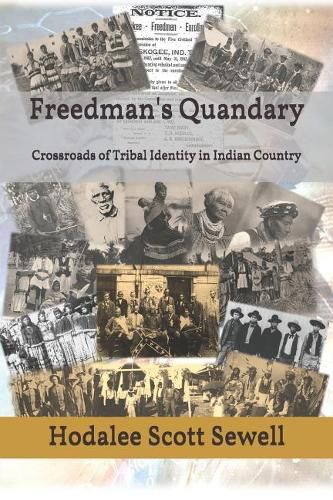Readings Newsletter
Become a Readings Member to make your shopping experience even easier.
Sign in or sign up for free!
You’re not far away from qualifying for FREE standard shipping within Australia
You’ve qualified for FREE standard shipping within Australia
The cart is loading…






The 1890 census counted 18,636 people of Negro descent in the Five Tribes present in the Indian Territory, communities who were made full members of the Five Tribes by treaties negotiated in 1866 with their emancipation from slavery to the individual Cherokee, Creek, Choctaw, Chickasaw, and Seminole Nation citizens who held them in bondage. Today their descendants are still known as the Freedmen, and many have seen their long historical ties to the Five Tribes being challenged, minimized, or severed. That federally recognized tribes have an inherent right to self-governance is at the foundation of their constitutional status, in the power exercised by them is not delegated by congressional acts, though Congress can limit tribal sovereignty. Unless a treaty or federal statute removes a power, however, the tribe is assumed to possess it even yet. Current federal policy in the United States recognizes this sovereignty and stresses the government-to-government relations between Washington, D.C. and the American Indian tribes. This right of tribal governments sometimes clashes with the rights of individual tribal members as individuals though.The story of the Creek, Seminole, and especially Cherokee Nation Freedmen’s struggle for political inclusion are examples of the oft-difficult teeter-totter relationship of civil rights as Americans versus the tribal sovereignty of indigenous nations. That these two important aspects of the unique political identity experienced by Native Americans can at times be antithetical to the other and in some instances divisive is a subject that needs more attention. This is well illustrated in the playing out of the Freedmen controversies or the growing incidents of disenrollment across Indian Country.The fate of the Freedmen of the Five Tribes in Oklahoma is important to Native America and especially Indian Country because their inclusion by treaty rests on the bedrock of the status of the Native American identity and dependent domestic nation sovereign status. Despite the fact some Freedmen admittedly have no native ancestry, they have been enrolled tribal members since 1866. As the Cherokee Nation and other of the historic Five Tribes do not determine tribal membership on the basis of blood quantum, an obviously racialized marker of group inclusion as many tribes across the country do, but instead use lineal descent, a genealogical based measure of belonging, recent events relating to the Freedman of the Five Tribes and Native American status, in general, make the crossroads of identity, race, and sovereignty encountered in their struggle are all the more significant. The Freedmen’s Quandary: Crossroads of Tribal Identity in Indian Country looks into that struggle.
$9.00 standard shipping within Australia
FREE standard shipping within Australia for orders over $100.00
Express & International shipping calculated at checkout
The 1890 census counted 18,636 people of Negro descent in the Five Tribes present in the Indian Territory, communities who were made full members of the Five Tribes by treaties negotiated in 1866 with their emancipation from slavery to the individual Cherokee, Creek, Choctaw, Chickasaw, and Seminole Nation citizens who held them in bondage. Today their descendants are still known as the Freedmen, and many have seen their long historical ties to the Five Tribes being challenged, minimized, or severed. That federally recognized tribes have an inherent right to self-governance is at the foundation of their constitutional status, in the power exercised by them is not delegated by congressional acts, though Congress can limit tribal sovereignty. Unless a treaty or federal statute removes a power, however, the tribe is assumed to possess it even yet. Current federal policy in the United States recognizes this sovereignty and stresses the government-to-government relations between Washington, D.C. and the American Indian tribes. This right of tribal governments sometimes clashes with the rights of individual tribal members as individuals though.The story of the Creek, Seminole, and especially Cherokee Nation Freedmen’s struggle for political inclusion are examples of the oft-difficult teeter-totter relationship of civil rights as Americans versus the tribal sovereignty of indigenous nations. That these two important aspects of the unique political identity experienced by Native Americans can at times be antithetical to the other and in some instances divisive is a subject that needs more attention. This is well illustrated in the playing out of the Freedmen controversies or the growing incidents of disenrollment across Indian Country.The fate of the Freedmen of the Five Tribes in Oklahoma is important to Native America and especially Indian Country because their inclusion by treaty rests on the bedrock of the status of the Native American identity and dependent domestic nation sovereign status. Despite the fact some Freedmen admittedly have no native ancestry, they have been enrolled tribal members since 1866. As the Cherokee Nation and other of the historic Five Tribes do not determine tribal membership on the basis of blood quantum, an obviously racialized marker of group inclusion as many tribes across the country do, but instead use lineal descent, a genealogical based measure of belonging, recent events relating to the Freedman of the Five Tribes and Native American status, in general, make the crossroads of identity, race, and sovereignty encountered in their struggle are all the more significant. The Freedmen’s Quandary: Crossroads of Tribal Identity in Indian Country looks into that struggle.